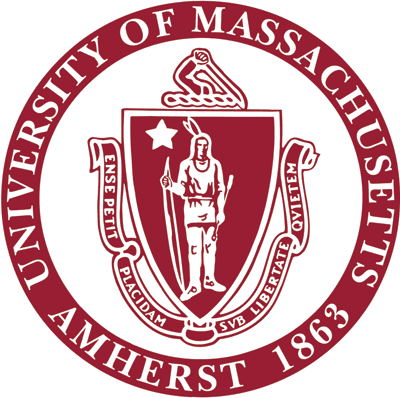
Professor
Andrew McCallum
Computer Science Department
University of Massachusetts Amherst
mccallum@cs.umass.edu
+1 413 545-1323 (vox)
+1 413 545-1789 (fax)
Andrew McCallum
Computer Science Department
University of Massachusetts Amherst
mccallum@cs.umass.edu
+1 413 545-1323 (vox)
+1 413 545-1789 (fax)

Bio from preface to Ph.D. thesis
Andrew McCallum was born in 1967,
near Boston, Massachusetts. He grew up in Beaconsfield, England and
Raleigh, North Carolina, eventually studying at The North Carolina
School of Science and Mathematics, a nationally acclaimed, public high
school.
He attended Dartmouth College from 1985 to 1989, and graduated summa cum laude, with a B.A. in Computer Science. While at Dartmouth he performed senior projects with Professor Barry Fagan, programming a SIMD Connection Machine to find large prime numbers, and with Professor Peter Sandon, helping redesign the department's course in Artificial Intelligence. He was also one of the first hackers on campus to write code for a pre-release NeXT machine, running NeXTSTEP version 0.8.
After undergraduate school, the author spent one year doing research in machine learning at Biomedical Information Communication Center, Oregon Health Science University, in Portland, Oregon. There, it was his privilege to build a amicable and productive relationship with Dr. Kent Spackman. McCallum worked on inductive learning for medical diagnosis, using both artificial neural networks and genetic algorithms. This work culminated the publication of his first paper, in the Proceedings of the 7th International Machine Learning Conference. He also wrote reams of code for the Center's "Hospital of the Future" physicians workstation, extending NeXT Computer's object-oriented user interface toolkit to create custom human-computer interface objects for displaying medical data.
In 1990, he entered the Ph.D. program at the University of Rochester, and in 1992 received an M.Sc. in Computer Science. At Rochester, he published both in operating systems and machine learning. The author became interested in the issues of reinforcement learning with selective perception while working with Dana Ballard and Steve Whitehead. Studying selective perception led the author directly to interest in problems with hidden state, which he continued to research under the advisorship of Dana Ballard.
McCallum wrote the Reinforcement Learning Toolkit, a software library that makes it easy to test various reinforcement learning algorithms in different environments with different sensory-motor systems. Parts of the library turned into the GNU Objective C Class Library, for which McCallum is the project leader. He also contributed to several other GNU projects, including GCC, Emacs and Guile.
He wrote two virtual reality simulators, the second on an SGI Onyx RealityEngine^2 machine, using SGI's Performer library. The simulator, called ``Persia,'' has been used to build simulated environments of everything from gazelles stampeding on the African plain to traffic-congested four-lane highways. The code is the main software engine for the virtual reality lab's study of human eye movements during complex, natural tasks.
In July 1995, he married Donna Kachites. The two live in Pittsburgh's Squirrel Hill neighborhood.
He attended Dartmouth College from 1985 to 1989, and graduated summa cum laude, with a B.A. in Computer Science. While at Dartmouth he performed senior projects with Professor Barry Fagan, programming a SIMD Connection Machine to find large prime numbers, and with Professor Peter Sandon, helping redesign the department's course in Artificial Intelligence. He was also one of the first hackers on campus to write code for a pre-release NeXT machine, running NeXTSTEP version 0.8.
After undergraduate school, the author spent one year doing research in machine learning at Biomedical Information Communication Center, Oregon Health Science University, in Portland, Oregon. There, it was his privilege to build a amicable and productive relationship with Dr. Kent Spackman. McCallum worked on inductive learning for medical diagnosis, using both artificial neural networks and genetic algorithms. This work culminated the publication of his first paper, in the Proceedings of the 7th International Machine Learning Conference. He also wrote reams of code for the Center's "Hospital of the Future" physicians workstation, extending NeXT Computer's object-oriented user interface toolkit to create custom human-computer interface objects for displaying medical data.
In 1990, he entered the Ph.D. program at the University of Rochester, and in 1992 received an M.Sc. in Computer Science. At Rochester, he published both in operating systems and machine learning. The author became interested in the issues of reinforcement learning with selective perception while working with Dana Ballard and Steve Whitehead. Studying selective perception led the author directly to interest in problems with hidden state, which he continued to research under the advisorship of Dana Ballard.
McCallum wrote the Reinforcement Learning Toolkit, a software library that makes it easy to test various reinforcement learning algorithms in different environments with different sensory-motor systems. Parts of the library turned into the GNU Objective C Class Library, for which McCallum is the project leader. He also contributed to several other GNU projects, including GCC, Emacs and Guile.
He wrote two virtual reality simulators, the second on an SGI Onyx RealityEngine^2 machine, using SGI's Performer library. The simulator, called ``Persia,'' has been used to build simulated environments of everything from gazelles stampeding on the African plain to traffic-congested four-lane highways. The code is the main software engine for the virtual reality lab's study of human eye movements during complex, natural tasks.
In July 1995, he married Donna Kachites. The two live in Pittsburgh's Squirrel Hill neighborhood.